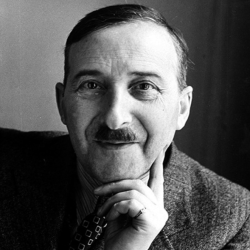
Stefan Zweig
Austrian writer
| Date of Birth | : | 28 Nov, 1881 |
| Date of Death | : | 22 Feb, 1942 |
| Place of Birth | : | Vienna, Austria |
| Profession | : | Writer |
| Nationality | : | Austrian |
Stefan Zweig was an Austrian writer who achieved distinction in several genres—poetry, essays, short stories, and dramas—most notably in his interpretations of imaginary and historical characters.
Zweig was raised in Vienna. His first book, a volume of poetry, was published in 1901. He received a doctorate from the University of Vienna in 1904 and traveled widely in Europe before settling in Salzburg, Austria, in 1913. In 1934, driven into exile by the Nazis, he emigrated to England and then, in 1940, to Brazil by way of New York. Finding only growing loneliness and disillusionment in their new surroundings, he and his second wife committed suicide.
Zweig’s interest in psychology and the teachings of Sigmund Freud led to his most characteristic work, the subtle portrayal of character. Zweig’s essays include studies of Honoré de Balzac, Charles Dickens, and Fyodor Dostoyevsky (Drei Meister, 1920; Three Masters) and of Friedrich Hölderlin, Heinrich von Kleist, and Friedrich Nietzsche (Der Kampf mit dem Dämon, 1925; Master Builders). He achieved popularity with Sternstunden der Menschheit (1928; The Tide of Fortune), five historical portraits in miniature. He wrote full-scale, intuitive rather than objective, biographies of the French statesman Joseph Fouché (1929), Mary Stuart (1935), and others. His stories include those in Verwirrung der Gefühle (1925; Conflicts). He also wrote a psychological novel, Ungeduld des Herzens (1938; Beware of Pity), and translated works of Charles Baudelaire, Paul Verlaine, and Émile Verhaeren.
Quotes
Total 20 Quotes
Life is futile unless it be directed towards a definite goal.
One never gets to know a person's character better than by watching his behavior during decisive moments. It is always only danger which forces the most deeply hidden strengths and abilities of a human being to come forth.
One must be convinced to convince, to have enthusiasm to stimulate the others.
There is nothing more vindictive, nothing more underhanded, than a little world that would like to be a big one.
The free, independent spirit who commits himself to no dogma and will not decide in favor of any party has no homestead on earth.
He who studies without passion will never become anything more than a pedant.
A word is nothing unless it has values and an atmosphere, unless you grasp its historical significance.
It would be foolhardy to count on the conscience of the world.
In history, the moments during which reason and reconciliation prevail are short and fleeting.
Only the misfortune of exile can provide the in-depth understanding and the overview into the realities of the world.
